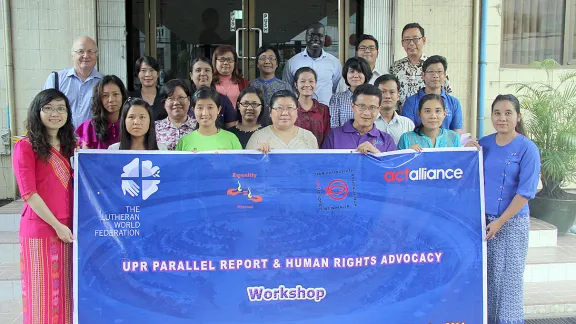
Participants in the first workshop on the 2015 UPR preparation in Yangon. Photo: Equality Myanmar
By Dr Ojot M. Ojulu
The LWF strategic approach to the United Nations (UN) Universal Periodic Review (UPR) mechanism is aimed at not only sharpening engagement with the UN human rights process itself but also in building local capacity to ensure UPR recommendations are translated into concrete policies and practices that change ordinary people’s lives.
When Myanmar’s human rights record was first reviewed in 2011, local civil society participation was unthinkable. In fact there was hardly any. All of the non-governmental organizations (NGOs) that submitted parallel reports to the UN did so from outside the country’s borders, as the political space at home was simply closed for civil society.
This time, things look different. In the course of the last three years, the government has radically eased many restrictions – politically, economically and socially. As the UN is poised to review the country again next year, local NGOs are busy conducting consultations and forming coalitions around the UPR to enhance their collective leverage in the review process. But there is one challenge—given the long history of isolation and absent civil society—most of the recently formed local NGOs have very little knowledge, if any, about the UN human rights mechanisms.
In order to create awareness on UN human rights mechanisms in general and the UPR in particular, experienced local NGOs such as ‘Equality Myanmar’ have been conducting training for “women, university students, monks and pastors, activists, school teachers, and community leaders” across the country. The LWF and other ACT alliance members provide technical, financial and moral support to such organizations to ensure that rights-based approach (RBA) is embedded in all their development projects.
At a workshop organized jointly by the LWF and its ACT Alliance partners in the capital Yangon, 23-24 October, more than 15 local organizations learned about the UN human rights protection mechanisms and how they could maximize their influence during the review process.
Ms Francesca P Traglia, LWF Myanmar deputy program manager explained RBA mainstreaming in all LWF’s projects and their preparatory consultations and plans for the UPR. At global level, I discussed the basics of advocacy and lobbying in Geneva in the UPR context and why having well written and credible report matters for effective advocacy.
At a second workshop, 27-30 October, LWF and other ACT alliance members discussed their specific UPR engagement plans, with a goal to identifying priority advocacy areas for Myanmar and Nepal during the forthcoming human rights reviews. Mr Michael French, interim global program coordinator at the LWF Department for World Service, discussed how the UPR engagement for both countries could serve as a model for other countries.
Dr Bijaya Bajracharya, the LWF Nepal country program coordinator said the workshop has “increased our knowledge and understanding on tools for advocacy with specific tangible expected outcomes for the right holders’ benefit.” She expressed her hope that “we will share this knowledge and skills with our colleagues in LWF Nepal and also with our implementing partners” and “we will apply the tools for better UPR report and evidence-based advocacy”.
Dr Ojot M. Ojulu is the LWF advocacy officer for International Affairs and Human Rights at DTPW


